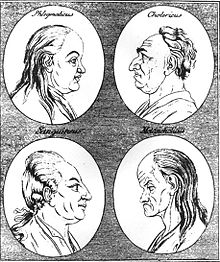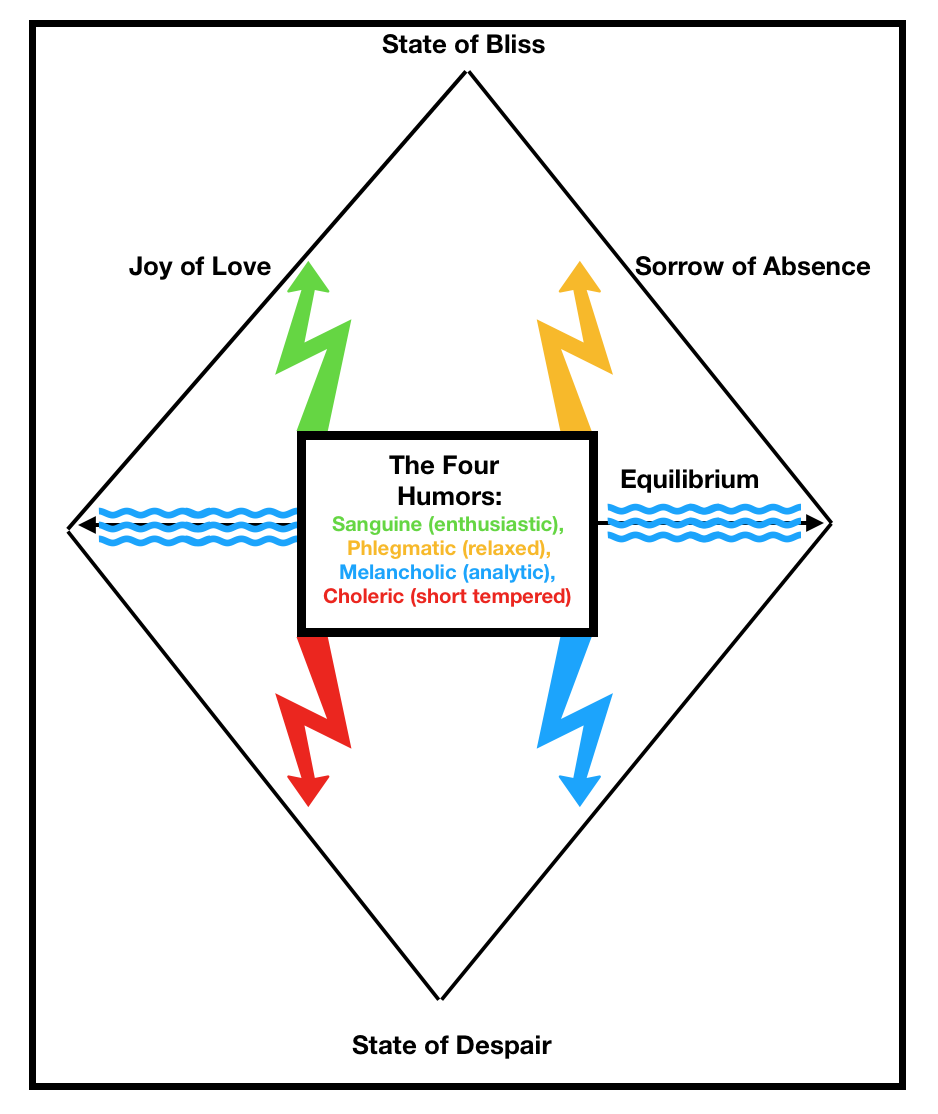
Argument: This study is meant to demonstrate the fickle nature of feelings, which are elusive. The four humors were considerably known to be the exemplified forms of character in the medieval mind. What reason have they drifted away from relevancy? On the contrary, these visages, demonstrate the thorough folly of the human being to drive their character to excess. A lack of balance among the four characters results in a disintegration of the human spirit and leads to death. A balance or “equilibrium”, as termed in the study, is the attainment of wholeness and true understanding. A lack of balance with the four humors leads to the polls of excess, which are accompanied by derangement, violence and the absence of formality.
Primary Evidence: The turning cycles of fate show that an abundance of joy leads to an abundance of sorrow and likewise to the opposite. Like a wheel of fortune, the fame of glory and the prosperity of success turns to withering and scarcity in different seasons. Just as the summer is hot, the winter is cold. Queen Iseut despairs over her love with Tristan.
“I complain of love to whom I had given my all: my heart and my body, my faith and my hope and all my service, more than to God himself or to any man; and I have, so I say, been ill rewarded for my service.” (180)
Iseut writes this letter to Queen Guinevere who receives her complaint. Being a well seasoned lover of the noble Lancelot, the Queen of Logres has sound advice for Iseut, who is in the throes of despair and contemplating suicide over her loss of love. Guinevere’s advice in her response letter contains within it the very essence of all discovery, human emotion, human frailty and truth of existence. In her response letter she writes the following.
“From love, it appears to me, we cannot always expect to have joy, but we should know for certain that since love is a human condition, human conditions are as unstable as the Wheel of Fortune which leads men where it wishes, now to the top, now to the bottom, now to joy, now to misery. Many say that love is a human condition as changeable as the wind. When love makes you live in the greatest possible sorrow and bitterness, at this very point you may be sure that there is absolutely no question but that this sorrow must needs cease and that joy will return in the end.” (181)
She further coins the term “et que la fin ne retort a vie” which is to say “joy will return in the end”. Her relation to the wheel of fortune in relation to love is must pointedly shedding light on another aspect of fickle fortune: glory and honor. Just as one enjoys an abundance of prosperity so does he grovel in the dust at the bitter end. King Arthur’s dream before his death at the Battle of Salisbury Plain contains the contextual theme of the Wheel of Fortune.
“When he had fallen asleep, it seemed to him that the most beautiful lady in the world appeared before him and lifted him up from the earth and took him up onto the highest mountain he had ever seen; and there she set him upon a wheel. The wheel had seats, some of which rose as others sank. The king saw that his seat was in the highest position The lady asked him, ‘Arthur, where are you?’ ‘Lady,’ he said, ‘I’m on a large wheel, but I don’t know what wheel it is.’ She said, ‘It’s the Wheel of Fortune.’ Then she asked him, ‘Arthur, what do you see?’ ‘Lady, it seems to me that I see the whole world.’ ‘Indeed,’ she said, ‘you do see it, and in it there is little that you have not been lord of until now, and of all you see, you have been the most powerful king who ever was. But such are the effects of earthly pride that no one is so highly placed that he can avoid falling from worldly power.’ And then she took him and dashed him to earth so cruelly that it seemed to King Arthur that he was crushed and that he lost all the strength of his body and its members.” (117)
Arthur’s fall from worldly power is paralleled to the downfall of love between Queen Guinevere and Lancelot. It appears the two are aligned with one another in synchronicity and both demonstrate the ultimate end of all earthly lusts. That of power is easily overturned as the body grows weak and leaves youth. Likewise, the power of love fades and subsides as youth and beauty burn in the perils of age and passions kindle in the fires of life.
We see that on both our left hand and our right hand there are clear signs of destruction. Let us, rather than grovel in this despair ourselves, look onwards to better things. A perfect balance and harmony, or homeostasis (to use modern terminology), must be maintained in order to aspire towards true perfection and inner sanctity. Just as the body regulates, sleeping at night and working by day, so must we regulate our emotions as not to cause an imbalance. Therefore, rather than being burned by the polls of excess, we must harmonize ourselves, in accordance with the four humors, lest we burn by the perils of excess and extremes.

Results: A diagram is most fitting to better visualize the elements in discussion as well as the perils of excess at the extreme polls. In light of the evidence, we see that a true balance through the duration of our lives is the true source of perfection and freedom from the worst mortal sins. How does excess lead to sin? An overabundance of enthusiasm will lead to depression. An abundance of relaxation will lead to sloth. An overabundance of sadness will lead to irascible excitement again. Of course, an abundance of anger will lead to violence. Whereas, if we properly maintain ourselves and the cool the fires of extremity and institute self governance, one can never be weary of the consequences. Thus, to deviate from the status of equilibrium is death unto the man who desires to keep from sin. Meanwhile, a harmonic balance of the four character dispositions leads to a harmonious, fulfilling, inner peace. The extremities cycle back through the time continuum and lead us astray from the true course. The joy of love leads to the summit of bliss and then declines towards the sorrow of absence. Likewise, sadness and anger lead to a state of despair and frustration. Any excitement beyond the equilibrium is a deviation from perfection; the moment it is caught by the individual they must resolutely set themselves upon returning to a status of equilibrium. Thus, life is like a game you play. Where evidence of one corruption comes to fruition, you blot it out, assuming the higher level of consciousness thereafter. Each experience in the extremes is a valuable lesson to learn how not to act. The end result is a mature, happy, fulfilled and balance individual.
Conclusion: The pursuit of power is illusive, and the excess will result in depravity within the soul. Meanwhile, the folly of love leads to despair, for no person (being imperfect and prone to error) may fulfill one’s inner desires in a state of dependency. Therefore, it is concluded that a balance within is required to keep safe the soul and not fall victim to the death pits of glory and love. Too much glory is pride and too much love is self centeredness. Conversely, it is further said by Queen Guinevere in her letter to Isuet: “He who falls from the greatest heights is the most badly
hurt.” (182) My parting advice to you is to take heed from these characters of the dangers of extremities. Caution yourself not to fall victim to pride, fear, self centeredness and anguish. Tristan was murdered for his love. Guinevere was almost put to death by fire for her guilt in adultery. Arthur lost his whole kingdom and was slain by his illegitimate son. The wise hermit whom meets with the Grail Knights provides a perfect analogy that I will leave you with. He says that Beauty, Prowess and Courtesy are the flowers of the earth. In principle, these flowers flourish. They inhabit the verdant pastures of the world and are emblematic of all civility, good conduct and earthly chivalry. Yet, no matter how one acts, it is certain that, eventually, the serpent of death will set aflame these precious flowers, so that they wither and die. That is the sting of death that will be felt by those who, even with good conduct, don’t heed the call to maintain equilibrium with their own soul.